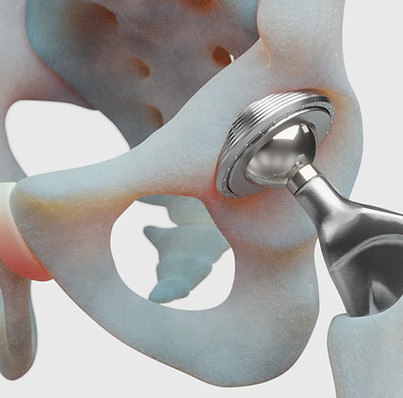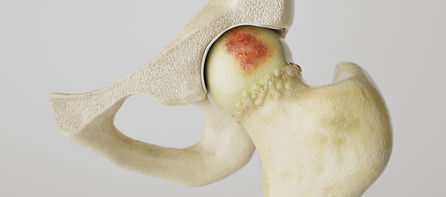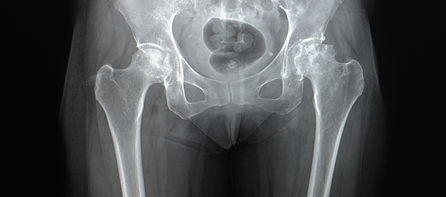
Hip Replacement Surgery
Hip Replacement Surgery in Singapore
Hip replacement surgery, also known as hip arthroplasty, is a procedure where the damaged portions of the hip joint are replaced with artificial implants. This is typically recommended when hip pain or stiffness begins to interfere with daily activities and quality of life, and when non-surgical options are no longer effective.
At Dr Chua Weiliang’s clinic, each patient is assessed carefully and offered a personalised care plan. Our approach emphasises clear communication, informed medical decision-making, and ongoing support throughout treatment and recovery.

What Is Hip Replacement Surgery?
Hip replacement surgery involves removing the worn-out surfaces of the hip joint, usually affected by arthritis or injury, and replacing them with smooth, durable implants. This helps restore movement, reduce friction, and relieve pain.
During the procedure, the femoral head (the ball) and the acetabulum (the socket) are replaced. The implants are designed to mimic natural joint function and improve mobility over time.
Types of Hip Replacement
Total Hip Replacement (THR)
In this procedure, both the femoral head and the hip socket are replaced. It is the most common type of hip replacement and is suitable for individuals with significant joint damage from osteoarthritis, rheumatoid arthritis, or avascular necrosis.
Partial Hip Replacement
This procedure involves replacing only the femoral head and is more commonly performed in certain types of hip fractures. It is not typically used for arthritis-related hip conditions.
Common Conditions That May Lead to Hip Replacement

Osteoarthritis
Gradual wear of the hip joint cartilage over time, often related to ageing or joint overuse

Rheumatoid arthritis
An inflammatory condition that damages the joint lining and contributes to stiffness and pain

Avascular necrosis (AVN)
Reduced blood supply to the femoral head, causing bone weakening and potential collapse

Hip fractures
particularly in older adults, where joint preservation may not be possible due to bone quality or fracture type
When Should Hip Replacement Be Considered?
A hip replacement may be discussed with your doctor if:
-
Persistent pain limits your ability to walk, climb stairs, or carry out daily tasks
-
The hip joint feels stiff, weak, or unstable, making movement difficult
-
There is difficulty getting in and out of chairs, cars, or bed
-
Imaging (e.g. X-rays) shows significant joint degeneration, such as cartilage loss, joint space narrowing, or collapse of the femoral head
Each case is assessed on an individual basis, taking into account your symptoms, lifestyle, and how the condition is affecting your everyday life.

Diagnosis and Pre-Surgical Evaluation
A comprehensive evaluation will be performed to determine whether hip replacement surgery is a suitable option for you. This typically includes:
-
A clinical examination to assess your hip’s range of motion, stability, and how symptoms are affecting your walking and daily function
-
Imaging studies, such as X-rays or MRI scans, to evaluate the extent of joint damage, cartilage loss, or bone changes
-
A review of your overall health, medical history, and any conditions that may influence surgical safety or post-operative recovery
We recognise that deciding to undergo surgery is a personal and significant step. Our goal is to provide clear, supportive information, answer your questions, and guide you through each stage, so that any decision you make is based on understanding, confidence, and care.
What To Expect During A Hip Replacement Surgery
Hip replacement surgery is a well-structured procedure aimed at relieving pain and improving mobility. Knowing what to expect can help you feel more at ease before surgery.
Step 1: Anaesthesia
You’ll receive either spinal or general anaesthesia to keep you comfortable and pain-free during the procedure.
Step 2: Accessing the Hip Joint
A careful incision is made to reach the hip joint, and surrounding muscles are gently moved aside.
Step 3: Removing Damaged Joint Surfaces
The damaged femoral head (ball) and the worn-out cartilage in the hip socket are removed.
Step 4: Placing the Implants
The artificial components are securely placed to replace the ball and socket, restoring smooth joint movement.
Step 5: Closing the Incision
The incision is closed with sutures and a sterile dressing is applied.
Step 6: Recovery Room Monitoring
You’ll be monitored closely as you recover from anaesthesia, then transferred to the ward for post-operative care.
Hip Replacement Recovery: What to Expect
Understanding what to expect after hip replacement surgery can help you feel more prepared and confident as you begin your recovery. While recovery experiences vary from person to person, the process generally follows a structured path that includes physiotherapy, close follow-up, and gradual return to daily function.
In-Hospital Recovery
Most patients stay in the hospital for 2 to 4 days after surgery. The care team will monitor your recovery closely and help you start walking with assistance, often within 24 hours after the procedure.
At-Home Recovery
Once you are home, recovery continues under the guidance of your physiotherapist. During this phase:
-
Swelling, bruising, and mild discomfort are common in the first 1 to 2 weeks
-
Daily exercises are essential to restore hip strength, flexibility, and balance
-
Adhering to a structured rehabilitation plan will help reduce stiffness and lower the risk of complications such as joint dislocation
A successful recovery often depends on consistent effort, clear communication with your care team, and setting realistic goals along the way.
Full Recovery Timeline
Most patients experience noticeable improvement in hip pain and mobility by 2 to 6 months after surgery. Progress may be gradual, but steady participation in rehabilitation tends to lead to positive long-term outcomes.
Potential Benefits of Hip Replacement
For those living with ongoing hip pain and stiffness, hip replacement can offer meaningful relief and help restore comfort in daily life. Many patients find:
-
Relief from persistent hip pain, making walking, sitting, and sleeping easier
-
Improved joint movement and stability for everyday tasks
-
A better quality of life with greater comfort, independence, and confidence
Every recovery is different. We’ll be here to guide your journey, with personalised care and support at every step.

Potential Risks and Considerations
While hip replacement is a common and generally safe procedure, it is important to be aware of potential risks.
Potential risks may include:
-
Infection
-
Blood clots
-
Dislocation
-
Implant wear or loosening
-
Limb length discrepancy
We understand that choosing surgery is a significant decision. Our goal is to help patients make informed choices through honest discussions, clear information, and personalised recommendations — always with your comfort, recovery, and long-term well-being in mind.
Hip Replacement Surgery Cost in Singapore
The average inpatient cost of hip replacement surgery at a private hospital in Singapore is around $47,875, according to the Ministry of Health. Actual costs may vary depending on the procedure’s complexity, type of implant, hospital, and ward class. Patients with Integrated Shield Plans may have a significant portion of the cost covered by insurance, helping to reduce out-of-pocket payment. For a more accurate cost estimate, a detailed consultation and financial counselling will be provided at our clinic.
Disclaimer: The cost estimates provided are for general reference. Final charges will depend on the specific surgical plan and hospital billing. Patients are encouraged to consult their insurer or hospital for a detailed financial counselling session. Medisave and insurance claims are subject to CPF and policy guidelines.

Dr Chua Weiliang: Hip Replacement Surgeon in Singapore
Orthopaedic Surgeon | Focused on Hip and Joint Conditions
Dr Chua Weiliang is a registered orthopaedic surgeon in Singapore who cares for individuals with joint conditions, including sports injuries, cartilage wear, and ligament problems. He is trained in both surgical and non-surgical treatments, and takes time to understand each patient’s concerns, goals, and lifestyle — so that care plans are personalised, thoughtful, and focused on helping them return to comfortable movement and daily life.
Insurance Partners
We accept Integrated Shield Plans and corporate insurance, and are on the specialist panels of several major insurers. Our team is here to guide you through claims, coverage, and any insurance-related queries.

Frequently Asked Questions
Disclaimer: This page is intended for general educational purposes. It is not a substitute for medical advice, diagnosis, or treatment. Please consult a healthcare professional for personalised recommendations.

Copyright © 2025, weiliangchua.com, All rights reserved.
Mount Elizabeth Medical Centre
(Orchard)
3 Mount Elizabeth, #16-03, Singapore 228510
+65 6235 8755
Mon - Fri: 9:00 am – 5:00 pm
Saturday: 9:00 am – 1:00 pm
Mount Elizabeth Medical Centre (Novena)
38 Irrawaddy Road #11-49/50/51
Singapore 329563
+65 6334 0622
Mon - Fri: 9:00 am – 5:00 pm
Saturday: 9:00 am – 1:00 pm







